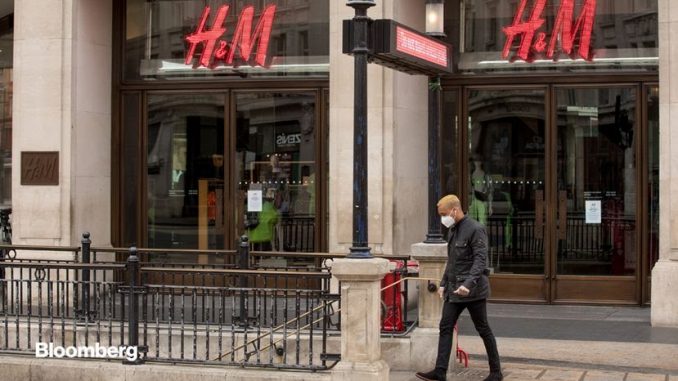
The coronavirus is turning Europe’s retail apocalypse into a nightmare for landlords and lenders.
Government-imposed lockdowns have shut stores across the region, leading retailers such as Hennes & Mauritz AB to stop paying the rent. The threat of a ripple effect across the continent’s real estate and banking sectors is looming.
At stake is not only the future of property companies, many of which are owned by funds managing the pensions of millions of savers and pensioners. The risk that real estate could trigger a wider financial crisis is rising again.
More than 1 trillion euros ($1.1 trillion) of debt is secured against commercial real estate in Germany, France and the U.K. alone, according to Cass Business School. In Britain, a nation of shopkeepers whose stores are almost all closed, interest on about 180 billion pounds ($224 billion) of commercial property debt is due over the next few weeks.
“Since the crisis affects us all, everyone must pull together,” H&M CEO Helena Helmersson said in an interview. Almost 4,000 of the company’s 5,000 stores are closed.
For troubled retailers, the coronavirus could be a tipping point, adding to landlords’ woes. British department-store operator Debenhams Plc may move to appoint administrators as early as next week to shield itself from creditors, according to media reports. Debenhams is making contingency plans, “with a view to protecting the business,” the company said in a statement.
Two of Britain’s biggest mall landlords say they collected less than 40% of the rent due this quarter. The British Property Federation estimates that the total March quarterly rent bill for U.K. retailers and leisure operators is about 2.5 billion pounds. Revo, a U.K. retail lobby group, says it’s even higher at 4.5 billion pounds.
Landlords will face steep shortfalls in income if most retailers withhold rent on stores they cannot operate. That would make it harder for property companies to pay interest and avoid covenant breaches on loans. In the worst-case scenario, if there is no forbearance from lenders, banks could call in loans and repossess assets.
Melanie Leech, chief executive officer of the BPF, said property companies need to be flexible on rent and support a distressed retail industry that employs millions of people across Europe. However, she said property companies also have “duties and obligations to their lenders and investors, who represent the savings and pensions of 45 million people around the country.”
Several European countries are legislating to temporarily halt interest payments. In the U.K. government support has mainly focused on tenants with relief on property taxes and help with wages.
“Lenders are flat-out dealing with calls from existing borrowers asking for waivers,” said David Barry, a senior director in debt advisory at broker Jones Lang La Salle Inc.
An analysis of the U.K.’s top malls by Cass Business School senior research fellow Nicole Lux found a 10% drop in rents could lead to a funding shortfall of about 6 billion pounds.
Intu Properties Plc, Britain’s largest shopping-center owner, was already struggling to raise capital and slash debt before the virus outbreak. The company said it has received just 29% of the rents owed for the past quarter and warned it will take a tough line against any chains that unilaterally withhold payments.
“We have neither the desire nor the financial capacity to bankroll global, well-capitalized brands who have just decided they don’t want to pay their rent,” Intu said.
Several high-profile retailers across Europe have angered landlords and politicians by withholding payments despite taking advantage of government emergency support. H&M and Adidas AG sparked criticism in Germany by seeking concessions on their rents while planning to access emergency measures many in the country believe should be used to support smaller companies less able to withstand the crisis. German Finance Minister Olaf Scholz called the sports giant’s behavior “irritating.”
Adidas has since backed down, paid its rent and apologized.
“We made a mistake and lost a lot of trust,” the shoemaker said, adding that business isn’t operating normally anywhere in the world. “Even a healthy company like Adidas can’t stand that for long.”
Across Europe, the continent’s biggest publicly traded retail landlords should have collected about 1.4 billion euros of rent last quarter.
In Britain, H&M angered property owners by asking for a rent holiday and threatening to exit leases early if the situation does not improve by June 23.
“This is an extreme situation,” an H&M spokeswoman said in a statement. “All activities in the company are now being carefully evaluated, including costs and risk perspective.”
Associated British Foods Plc, the owner of discount-fashion chain Primark, held back 33 million pounds of rent on its British stores. After it closed all its shops across Europe and the U.S., Primark is missing out on 650 million pounds of revenue a month.
“These are extraordinary times and it is not as if this situation is pain-free for us,” said John Bason, ABF’s finance director. He and other company directors have taken a 50% pay cut “at a time when many Primark employees will see their livelihoods affected by Covid-19.”
Retailers are trying to mitigate the impact of the shutdown by cutting costs. U.K. store sales plummeted by a record 34% in March, according to consultancy group BDO. Total sales, including online, fell 18%.
Property owners face their own challenges. Chris Grigg, chief executive officer of British Land Plc, said he had never experienced a crisis like this. The U.K.’s fourth-largest listed property company waived quarterly rent for smaller retail tenants.
Vivienne King, chief executive officer of retail lobby group Revo, stressed the need for cross-industry solutions and consensual negotiations.
“When the virus has passed, we will be looking at a very different world,” she said.
*story by Bloomberg